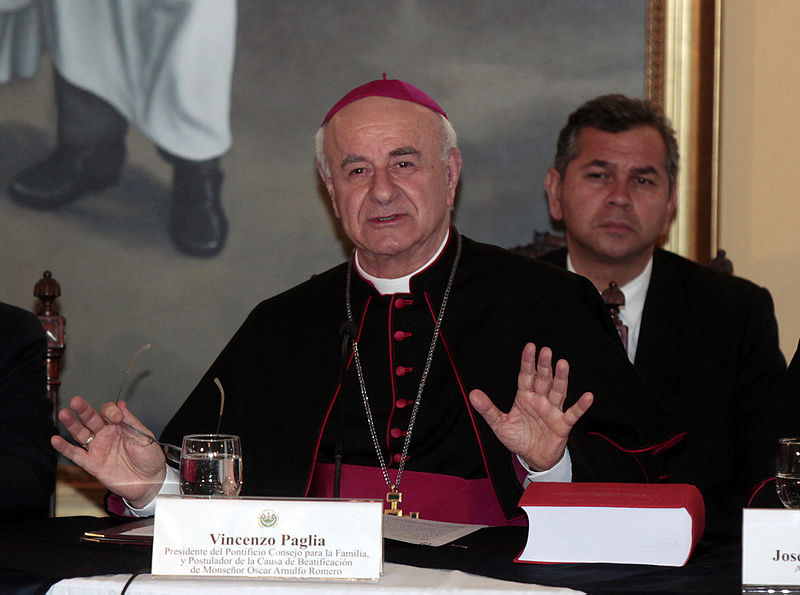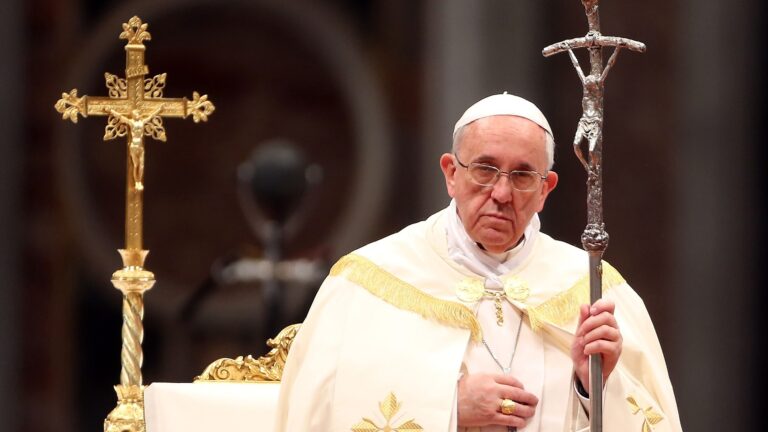“When I use a word,” Humpty Dumpty said in rather a scornful tone, “it means just what I choose it to mean — neither more nor less.”
Lewis Carroll, Through the Looking Glass
In February 1994, Pope John Paul II founded the Pontifical Academy for Life “to study and provide information and training about the principal problems of law and biomedicine pertaining to the promotion and protection of life, especially in the direct relationship they have with Christian morality and the directives of the Church’s Magisterium.”
Members of the Academy did just that until 2016, when Pope Francis revised the organization’s founding documents and appointed Archbishop Vincenzo Paglia as the new president.
It didn’t take long for controversy to break out. In 2017, Father Maurizio Chiodi, one of the archbishop’s first appointments, claimed that Humanae Vitae is optional. It’s “an authoritative document, but with no claim to infallibility,” he said.
In 2019, Abp. Paglia confirmed the change of course, announcing that “the Academy in particular is to become more and more a place of competent and respectful meeting and dialogue.” He also stressed that “the term ‘life’ must be redefined, moving from an abstract conception to a ‘personal’ dimension.”
By 2022, the spirit of “dialogue” had led to a bold, undisguised challenge of Church teaching from the Academy:
“Be careful: what is dissent today, can change. It is not relativism, it is the dynamics of the understanding of phenomena and science: the Sun does not rotate around the Earth. Otherwise, there would be no progress and everything would stand still. Even in theology. Think about it.”
As the director of PRI’s Rome office, Katarina Carranco, reported at the time, the Academy had just published a book that embodied those “dynamics,” with some contributors arguing that contraception could be used by couples under some circumstances.
If that weren’t bad enough, the archbishop then told an interviewer that Italy’s pro-abortion law was “a pillar of our social life.”
The faithful finally said, “enough!” Last month, a distinguished group of scholars held a conference in Rome to reaffirm Humanae Vitae as the timeless magisterial teaching of the Church.
Setting The Record Straight
Cardinal Luis Ladaria Ferrer, S.J., Prefect of the Vatican Dicastery for the Doctrine of the Faith, opened the conference with a resounding defense of Humanae Vitae’s affirmation of the harmony of freedom and nature in the human person. “The prophetic nature of the encyclical is grounded in the integral anthropological vision of what the truth of love, sexuality, and life means,” he explained.
“The encyclical Humanae Vitae addressed issues of sexuality, love, and life, which are intimately interconnected,” he continued. “These are issues that affect every human being in any era. For this reason, its message is still valid and relevant today. Pope Benedict XVI expressed it in these words: “What was true yesterday remains true today. The truth expressed in Humanae Vitae does not change; on the contrary, precisely in the light of new scientific discoveries, its teaching becomes more timely and provokes reflection on its intrinsic value.”
Later in the same program, Dr. John Haas, longtime president of the National Catholic Bioethics Center, made a fascinating observation about an American reaction to the Episcopal Church’s Lambeth Conference’s approval of contraception in 1930:
“The Washington Post, today considered one of the most liberal newspapers in the United States, said in an editorial. ‘The committee’s report if carried into effect would sound the death-knell of marriage as a holy institution, by establishing degrading practices which would encourage indiscriminate immorality. The suggestion that the use of legalized contraceptives would be ‘careful and restrained’ is preposterous.’ (March 22, 1931).”
Evidently, the Washington Post is not infallible. Is Humanae Vitae?
“I am not suggesting that there is a slippery slope from contraception to abortion” Dr. Haas continued. “I am maintaining that when one can morally justify the commission of an intrinsically evil act, we are already at the bottom of the slope and virtually any act can be justified.”
Today’s Washington Post agrees – and proves it by “justifying” every possible depraved and decrepit act imaginable.
Dynamics, Dialogue, and Dead Ends
“I love mankind,” he said, “but I find to my amazement that the more I love mankind as a whole, the less I love man in particular.”
― Fyodor Dostoyevsky, The Brothers Karamazov
“The only way you can coast is downhill,” as the old saying goes, and the archbishop has been doing just that for more than six years. But he was caught off guard when the Vatican News pressed a little too hard in an interview the day after the Rome conference ended.
“Today we have to deal with rescuing both our planet and humanity as a whole,” the questioner began. “In this context, looking at Church teaching, what is your assessment of Humanae Vitae, 55 years after its publication?”
Perhaps flustered by the reference to “Church teaching,” the archbishop first implied that contraception was no longer an issue, and then tried to change the subject.
“In the Sixties, ‘the pill’ was considered a total evil,” Paglia said. “Today, we face even greater dangers. All human life is at risk if we don’t stop spiraling conflict, the arms race, if we don’t stop destroying the environment.”
Once upon a time – for approximately two thousand years, in fact – “Church teaching” taught that contraception was an objective evil.
But Paglia wants to move on. The head of the “Pontifical Academy for Life”, who said four years ago that “the term ‘life’ must be redefined”, now explains why: so he can use it to eviscerate Humanae Vitae in the name of pathetic political slogans about the arms race and environment.
Paglia blathers on: “As we have wisely come to understand, we have to continue interrogating Humane Vitae for a deeper understanding of the connection that ties sexuality, married love and generation together, a connection made clearer by a personalist approach,” the archbishop answered.
But his misdirection and evasiveness didn’t work. The interviewer wanted a specific answer.
“In Article 14 of the Encyclical, Paul VI states that any action specifically intended to prevent procreation is not permissible,” he asked, “a prohibition that is considered to have created ‘distance’ between the faithful and the Magisterium. What is your opinion about it?”
Trapped, the archbishop exclaimed, “I am in agreement with every provision of Humanae Vitae. You will find no one who defends life more fiercely and tenaciously than I do.”
To most people, however, Paglia’s supposedly fierce and tenacious defense of HV sounds more like a clever exit strategy to from 2,000 years of Church teaching: Just take a “personalist approach” and you’ll gain a “deeper understanding,” enriched by “dialogue” and “dynamics.”
Not so fast, Archbishop Paglia. According to Jacques Maritain, one of the twentieth century’s greatest Catholic philosophers, “there are, at least, a dozen personalist doctrines, which, at times, have nothing more in common than the term ‘person’.”
The doctrines, Maritain concludes, reflect a “quite uneven intellectual exactitude and precision.”
In other words, “personalist” can mean whatever Archbishop Paglia wants it to mean, with “at least a dozen” paths to escape from the magisterial truth of Humanae Vitae.
Want to preach the environment? Try ecological personalism! Want to solve the arms race? Well, use “power personalism.”
The archbishop can conjure up a host of ideological distractions, and they’re all “even worse” than the “totally evil” pill!
And the more he “interrogates” the encyclical, the more uncertainty, doubt, and fog crops up. Humpty Dumpty always gets to choose the meaning of the word.
“We all want progress,” C. S. Lewis once said. “But if you’re on the wrong road, progress means doing an about-turn and walking back to the right road.”
Archbishop Paglia has left Humanae Vitae behind. But rather than making the U-turn suggested by Mr. Lewis, he has stepped on the gas.
He’s going so fast that he missed the street sign – “Strada Senza Uscita.”
Dead End.











